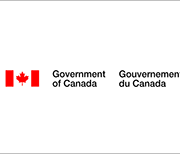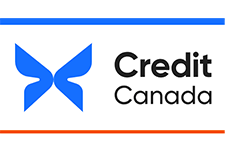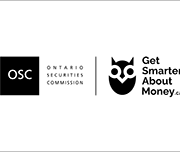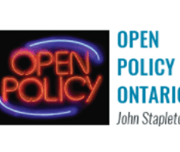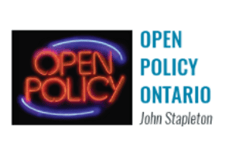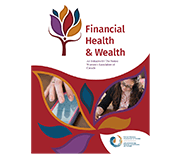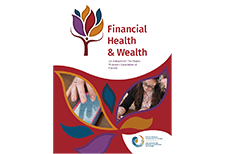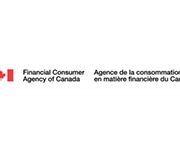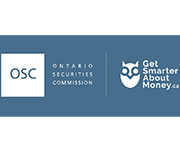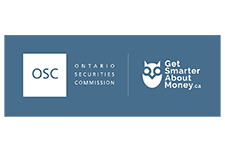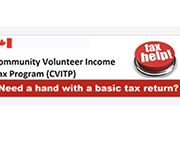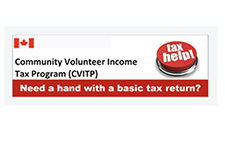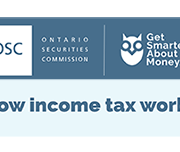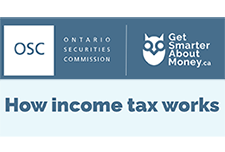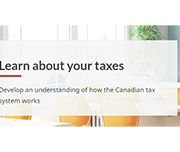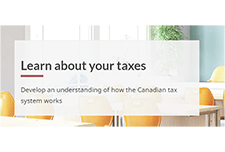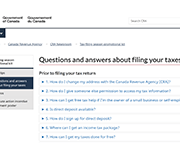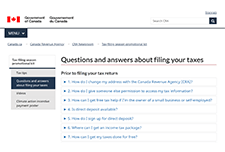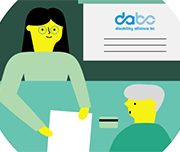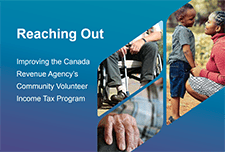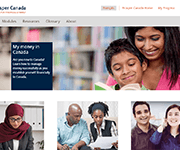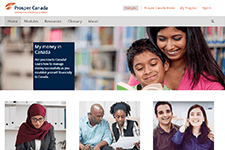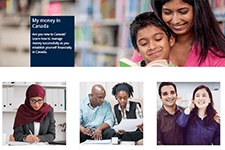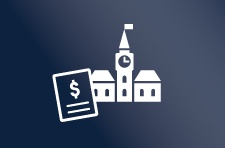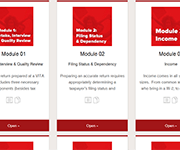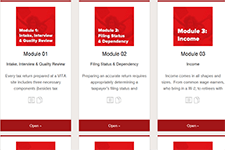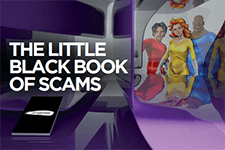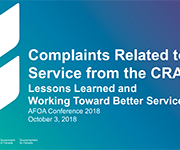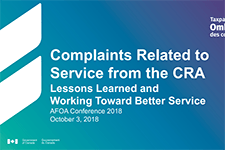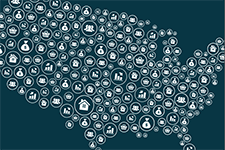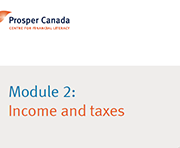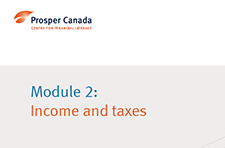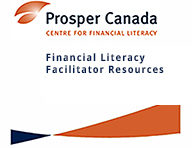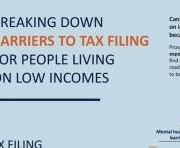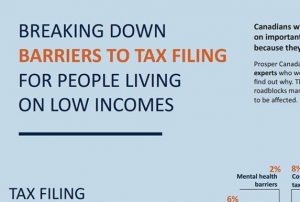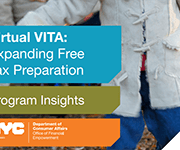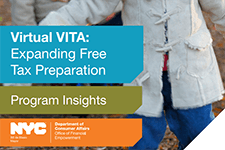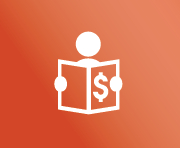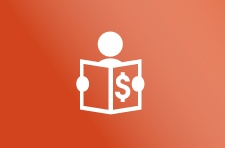Financial Health & Wealth
You worry about your family's physical, mental and spiritual health. You take care of yourself and make sure you and your family are healthy, safe and happy. Many people do not realize that you also need to be financially healthy. Financial wellness is understanding and managing your own money. Money is a big way that others control and influence our lives. Sometimes we need to depend on others to give us money and tell us what to do with money. Opening a bank account, understanding where your money is coming from, and saving money will help you to become financially independent and financially healthy. This report from The Native Women's Association of Canada covers the importance of financial health and has sections on financial information covering bank accounts, insurance, budgeting, saving, credit cards, car loans, income taxes and housing.
Your financial toolkit
A comprehensive learning program that provides basic information and tools to help adults manage their personal finances and gain the confidence they need to make better financial decisions. Learn more about the program and how to use the learning modules.
Community volunteer income tax program (CVITP)
Need help filing your taxes? You may be able to avail of the Community Volunteer Income Tax Program. The Community Volunteer Income Tax Program (CVITP) has existed since 1971 and is a longstanding partnership between the Canada Revenue Agency (CRA), and community organizations and their volunteers. Tax clinic volunteers complete tax and benefit returns for eligible individuals to ensure they receive, or continue to receive, their entitled benefit payments. In Québec, volunteers prepare both the federal and provincial tax return. The CVITP service is offered free of charge to everyone who meets the eligibility criteria, and includes doing taxes for the current and previous years. For the 2022 tax season, community organizations are hosting free in-person and virtual tax clinics.
How income tax works
Filing your taxes might be one of the most important financial actions you’ll take each year. It can also feel confusing or stressful at times. Find out more about how income tax works, including tax deductions and tax credits using the Ontario Securities Commission's interactive chart to see what tax bracket you are in.
Learn about your taxes (free CRA online course)
A free online course to learn about personal income taxes in Canada, developed by the Canada Revenue Agency. Contents include: Additional resources for teachers and facilitators are available.
Questions and answers about filing your taxes
Questions and answers released by the Canada Revenue Agency (CRA) about filing your taxes, including information on:
Disability Alliance BC
Disability Alliance BC supports people in British Columbia with disabilities through direct services, community partnerships, advocacy, research and publications. Their website provides information on disability benefits including the Disability Tax Credit (DTC), CPP Disability, Registered Disability Savings Plans (RDSP) and more.
Reaching Out: Improving the Canada Revenue Agency’s Community Volunteer Income Tax Program
The position of Taxpayers’ Ombudsman (the Ombudsman) was created to support the government priorities of stronger democratic institutions, increased transparency within institutions, and fair treatment. As an independent and impartial officer, the Ombudsman handles complaints about the service of the Canada Revenue Agency (CRA). The Office of the Taxpayers’ Ombudsman hears first-hand the concerns of individuals, tax practitioners, and community support organizations. The Ombudsman visited with Community Volunteer Income Tax Program (CVITP) partner organizations, volunteers, and the Canada Revenue Agency’s (CRA) CVITP coordinators to learn more about the program and to understand the success stories and challenges they all experience. This report gives voice to what they have heard and provides recommendations on how to address the issues raised.
My money in Canada
Are you a newcomer to Canada, or someone who works with newcomers? This online tool will help you explore five money modules to better manage your finances in Canada. Learn about the financial system in Canada, income and expenses, setting goals and saving, credit and credit reports, and filing taxes. Updated July 26, 2022: My money in Canada provides important information about Canada’s financial system and promotes positive money management habits to support Canadians to succeed financially. Interactive exercises and checklists support you to make informed choices and to create a customized financial plan that works for you. Originally designed to support newcomers to Canada as they settle and establish themselves financially, My money in Canada has been updated to serve all Canadians, including those who are new to Canada.
My money in Canada
This online tool will help you learn about the financial system in Canada and how to manage your money. Explore five money modules on banking, income and expenses, money goals and savings, credit, and taxes. Clients can do the modules in the order they appear, or just the ones they want to use. The tool is intended to be used with clients and settlement workers together, but can also be used by the client on their own if they are comfortable.
English
2023 Tax Resources: Canada Revenue Agency
The Canada Revenue Agency kicks off the 2023 Tax filing season
- Factsheet – Students
- Factsheet – Persons with disabilities
- Factsheet – Modest income individuals
- Factsheet – Housing insecure individuals
- Factsheet – Adults 65 and older
- Factsheet – Indigenous peoples
- Factsheet: Northern residents deductions
- Factsheet: Individuals experiencing gender based violence
- Factsheet – Newcomers
Resources
- Infographic: Child-related benefits
- Infographic: Newcomers
- Tear sheet: Register for my account
- Tear sheet: Doing your taxes
- Service option card
- Video: Individuals with a modest income
- Video: Persons with disabilities
- Video: International Students
- Video: Students, it pays to do your taxes!
- SimpleFile by Phone automated phone service (formerly called File my Return)
2022 Tax Resources: Canada Revenue Agency
- Benefits and credits fact sheet – Students
- Benefits and credits fact sheet – Persons with disabilities
- Benefits and credits fact sheet – Modest income individuals
- Benefits and credits fact sheet – Housing insecure individuals
- Benefits and credits fact sheet – Adults 65 and older
- Benefits and credits fact sheet – Women in shelters
- Benefits and credits fact sheet – Indigenous peoples
- Benefits and credits fact sheet – Newcomers
Canada Dental Benefit
One-time top-up to the Canada Housing Benefit
Get your taxes done for free at a tax clinic
Canada workers benefit
Make sure you maximize the benefits you are entitled to if you are First Nations, Inuit, or Métis
2021 Tax Resources - Canada Revenue Agency
Last-minute tax tips (Canada Revenue Agency) – April 13, 2021
New Canada Recovery Benefits – What to Expect
Answers to your questions on paying back the Canada Emergency Response Benefit (CERB)
Benefits and credits fact sheet – Indigenous people living in Canada
Benefits and credits fact sheet – Modest income
Benefits and credits fact sheet – Newcomers
Benefits and credits fact sheet – Newcomers in Quebec
Benefits, credits, and deductions for Seniors
COVID-19 Measures for Persons with Disabilities
Benefits and credits – Persons with Disabilities
Canada Workers Benefit – Infographic
Canada Workers Benefit – promotion card
Get your taxes done for free – promotion card
Income tax basics
Why file? The benefits of tax filing (Tax toolkit)
Getting government payments by direct deposit
Income tax 101: What are tax deductions, benefits, credits, exemptions, and brackets? (Tax toolkit)
Considerations for Indigenous people at tax time (Tax toolkit)
Resources about tax filing in Canada (Tax toolkit)
Common tax deductions
Common sources of income and their tax slips
Notice of Assessment – how to read it
Community tax clinic guides
About volunteer tax clinics: Help your community members file their taxes (Tax toolkit)
Getting started as a community tax clinic (Tax toolkit)
Tax clinic staff and volunteer roles (Tax toolkit)
Tax clinic preparation: Recommended timeline (Tax toolkit)
Insights on planning free tax clinics in Indigenous communities: Infographic (Tax toolkit)
Encouraging tax filing at virtual clinics (sample “active choice” email) – The Behavioural Insights Team *NEW*
Tax clinic resources for practitioners
The tax clinic resources below are from our community partner organizations. These are examples that may be adapted to your own community tax clinic needs. Whenever possible, we have credited the original author of each document and included contact information if you would like to find out more about using and adapting the resource.
Resources to support tax clinic delivery and tax filing
Simplified Intake Form 2019 (ACSA, Scarborough, ON)
Tax Clinic Host Checklist (The Working Centre, Kitchener-Waterloo, ON)
Income tax checklist for participants (The Working Centre, Kitchener-Waterloo, ON)
Intake form for Couples (E4C, Edmonton, AB)
Tax Prep Quick Reference Guide (E4C, Edmonton, AB)
Other resources to support participants at tax time
Income tax summary (The Working Centre, Kitchener-Waterloo, ON)
Form for Missing Income Info for Revenue Canada (The Working Centre, Kitchener-Waterloo, ON)
Forms for rental information (The Working Centre, Kitchener-Waterloo, ON)
Referral to FEPS (The Working Centre, Kitchener-Waterloo, ON)
Envelope checklist (E4C, Edmonton, AB)
Seniors Info Sheet – Federal and provincial benefits (E4C, Edmonton, AB)
Resources for outreach and promotion
Tax clinic flyer (ACSA, Scarborough, ON)
2019 tax clinic flyer (Jane Finch Centre, Toronto, ON)
2019 tax clinic flyer (North York Community House, Toronto, ON)
Resources to support tracking and evaluation
Tax data entry sheet – Tax toolkit (Sunrise Community Centre, Calgary, AB)
Anonymous tax tracking sheet (Aspire collective, Calgary, AB)
Additional information and resources on tax filing
Benefits, credits and financial support: CRA and COVID-19 – Canada Revenue Agency (CRA)
Covid-19: Free virtual tax clinics – Canada Revenue Agency (CRA)
Get ready to do your taxes – Canada Revenue Agency (CRA)
Taking care of your tax and benefit affairs can pay off (tax filing info sheet) – Canada Revenue Agency (CRA) *NEW
Slam the scam – Protect yourself against fraud – Canada Revenue Agency (CRA)
Virtual Tax Filing: Piloting a new way to file taxes for homebound seniors – Prosper Canada
Webinar Series on Taxes (May 2020) – Momentum
SimpleFile by Phone automated phone service (formerly called File my Return) – Prosper Canada Learning Hub
Tax season prep – Plan Institute
Demystifying the Disability Tax Credit – Canada Revenue Agency (CRA)
What to do if your tax return is reviewed or audited – OSC
French
Ressources de déclaration de revenus 2024 - Agence du revenu du Canada
Ressources de déclaration de revenus 2023 - Agence du revenu du Canada
L’Agence du revenu du Canada lance la saison des impôts 2023
- Fiche descriptive: Étudiants
- Fiche descriptive: Les personnes handicapées
- Fiche descriptive: Les personnes à revenu modeste
- Fiche descriptive: Les personnes en situation de logement précaire
- Fiche descriptive: Les personnes âgées de 65 ans et plus
- Fiche descriptive: Les personnes autochtones
- Fiche descriptive : Déductions pour les habitants de régions éloignées
- Fiche descriptive : Personnes aux prises avec la violence fondée sur le sexe
- Fiche descriptive: Les nouveaux arrivants
Ressources
- Infographie – Prestations pour enfants
- Infographie – Prestations et crédits pour les nouveaux arrivants
- Feuille détachable : Inscrivez-vous à Mon dossier
- Feuille détachable : Produire votre déclaration de revenus
- Carte d’option de service
- Webinaire – Les personnes à revenu modeste
- Video: Persons with disabilities
- Webinaire – Les étudiants étrangers
- Webinaire – Avis aux étudiants : c’est payant de faire vos impôts!
Ressources de déclaration de revenus 2022 - Agence du revenu du Canada
Fiche descriptive : Étudiants
Fiche descriptive : Les personnes handicapées
Fiche descriptive : Les personnes à revenu modeste
Fiche descriptive : Les personnes en situation de logement précaire
Fiche descriptive : Les personnes âgées de 65 ans et plus
Fiche descriptive : Femmes dans les refuges
Fiche descriptive : Les personnes autochtones
Fiche descriptive : Les nouveaux arrivants
Prestation dentaire canadienne
Supplément unique à l’Allocation canadienne pour le logement
Faites faire vos impôts à un comptoir d’impôts gratuit
Allocation canadienne pour les travailleurs
Assurez-vous de maximiser les prestations auxquelles vous avez droit si vous êtes Autochtone, Inuit ou Métis
Ressources de déclaration de revenus 2021 - Agence du revenu du Canada
Nouvelles prestations canadiennes de la relance économique – À quoi s’attendre
Réponses à vos questions sur le remboursement de la Prestation canadienne d’urgence (PCU)
Recevez vos versements de prestations et de crédits! – Les les autochtones qui habitent au Canada
Prestations et crédits – Revenu modeste
Nouveaux arrivants, vous pourriez recevoir des prestations et des crédits!
Nouveaux arrivants, vous pourriez recevoir des prestations et des crédits! (Quebec)
Il y a des avantages à faire ses impôts! – Personnes agées
Mesures relatives à la COVID-19 à l’intention des personnes handicapées
Des prestations et des crédits pour vous! – Les personnes handicapées
Chaque dollar compte! – L’allocation canadienne pour les travailleurs (ACT)
Chaque dollar compte! Carte promotionnelle pour l’allocation canadienne pour les travailleurs (ACT)
Faites faire vos impôts gratuitement – Carte promotionnelle
Fondements de l’impôt sur le revenu
Pouruoi declarer? Les avantages de produire une declaration de revenus
Recevoir des paiements du gouvernement par dépôt direct
Que sont les déductions, les avantages fiscaux et les crédits d’impôt?
Considérations sur la période d’impôt pour lesautochtones qui habitent au Canada
Ressources pour en savoir plus
Comptoirs d’impôt bénévoles : Aidez les membres de votre communauté
Ressources
S’occuper de ses impôts et de ses prestations peut être payant – Agence du revenu du Canada
Service automatisé Déclarer simplement par téléphone (anciennement Produire ma déclaration)– Agence du revenu du Canada
Démystifier le crédit d’impôt pour personnes handicapées – Agence du revenu du Canada
The Little Black Book of Scams (2nd edition)
Scammers are sneaky and sly. They can target anyone, from youngsters to retirees. They can also target businesses. No one is immune to fraud. Read this booklet to find out how you can also become a fraud-fighting superhero. Share this booklet with family and friends and start powering up!
Our group of superheroes has found a way to see through the scams. Their secret is simple: knowledge is power!
Complaints Related to Service from the CRA: Lessons Learned and Working Towards Better Service
Operating at arm’s length from the Canada Revenue Agency, the Office of the Taxpayers' Ombudsman (OTO) works to enhance the Canada Revenue Agency's (CRA) accountability in its service to, and treatment of, taxpayers through independent and impartial reviews of service-related complaints and systemic issues. OTO receives complaints and concerns from members of First Nations, Inuit and Métis communities. In this conference presentation, the Taxpayers’ Ombudsman provides examples of the types of issues her Office receives in order to provide community leaders with her insights in helping Indigenous people get better service from the CRA. In support of the AFOA Canada 2018 National Conference theme of Human Capital – Balancing Indigenous Culture and Creativity with Modern Workplaces, this presentation will provide participants with information on the types of issues and trends her office sees from members of the Indigenous communities and on better ways of serving these populations.
Who pays? A Distributional Analysis of the Tax Systems in all 50 States
Who Pays: A Distributional Analysis of the Tax Systems in All Fifty States (the sixth edition of the report) is the only distributional analysis of tax systems in all 50 states and the District of Columbia. This comprehensive report assesses tax fairness by measuring effective state and local tax rates paid by all income groups. No two state tax systems are the same; this report provides detailed analyses of the features of every state tax code. It includes state-by-state profiles that provide baseline data to help lawmakers and the public understand how current tax policies affect taxpayers at all income levels.
Backgrounder: Working Income Tax Benefit
The federal government has indicated that it will expand WITB by approximately $250 million per year beginning in 2019 to “provide additional benefits that roughly offset incremental Canada Pension Plan (CPP) contributions for eligible low-income workers.”1 The changes to CPP will be phased in, starting in 2019. These changes mean that workers will be paying higher CPP contributions from their paycheques. Low-income workers especially could feel the impact on their take-home pay. This backgrounder provides an introduction to the program, explores how it impacts low-income workers, and how it could be improved.
Handout 2-8: Glossary
This activity sheet is from Module 2 of the Financial Literacy Facilitator Resources from Prosper Canada. Glossary for income and taxes module. To view full Financial Literacy Facilitator Resources, click here.
Handout 2-7: Resources
This activity sheet is from Module 2 of the Financial Literacy Facilitator Resources from Prosper Canada. Resource list for income and taxes module. To view full Financial Literacy Facilitator Resources, click here.
Activity sheet 2-6: Income and taxes
This activity sheet is from Module 2 of the Financial Literacy Facilitator Resources from Prosper Canada. Goal setting for filing your income taxes. To view full Financial Literacy Facilitator Resources, click here.
Handout 2-4: Filing your taxes
This handout is from Module 2 of the Financial Literacy Facilitator Resources from Prosper Canada. How to file your taxes. To view full Financial Literacy Facilitator Resources, click here.
Handout 2-3: Reading a pay stub
This handout is from Module 2 of the Financial Literacy Facilitator Resources from Prosper Canada. How to read a pay stub. To view full Financial Literacy Facilitator Resources, click here.
Activity sheet 2-2: Reading David’s pay stub (quiz)
This activity sheet is from Module 2 of the Financial Literacy Facilitator Resources from Prosper Canada. Reading David's pay stub - a quiz. To view full Financial Literacy Facilitator Resources, click here.
Activity sheet 2-5: Maria and Fernando’s story
This activity sheet is from Module 2 of the Financial Literacy Facilitator Resources from Prosper Canada. Maria and her husband Fernando worked together cleaning a big office building at night. They were hired by a man who ran a large cleaning company. They each got a paycheque twice a month. In February, it was time to do income tax for their previous year’s income. To view full Financial Literacy Facilitator Resources, click here.
Breaking down barriers to tax filing for people living on low incomes – Infographic
This infographic by Prosper Canada summarizes the barriers to filing taxes faced by people living on low incomes. These barriers include access challenges, fear, lower literacy, and other challenges.
Virtual VITA: Expanding Free Tax Preparation. Program Insights
This brief highlights findings from a small-scale pilot that integrated Virtual Volunteer Income Tax Assistance (VITA) services at two New York City Head Start programs during the 2013 tax season. The New York City Department of Consumer Affairs Office of Financial Empowerment (OFE) coordinated the pilot in partnership with the Administration for Children & Families (ACF) Region Food Bank For New York City was the VITA provider. Participating Head Start programs included The Children’s Aid Society and Kingsbridge Heights Community Center (KHCC).
English
Module 1: Exploring your relationship with money
Module 2: Income and taxes
Handout 2-1 Government benefits
Activity Sheet 2-2 Reading David’s pay stub quiz
Handout 2-3 Reading a pay stub
Handout 2-4 Filing your taxes
Activity Sheet 2-5 Maria and Fernandos story
Activity Sheet 2-6 Goal-setting
Handout 2-7 Resources
Handout 2-8 Glossary
Video: Tax Deductions Credits and Benefits (video transcript) *NEW*
Module 3: Budgeting
Activity Sheet 3-1 The “B” word-budget
Activity Sheet 3-2 Income sources
Activity Sheet 3-3 Expense categories
Activity Sheet 3-4 Budgeting scenarios
Activity Sheet 3-5 Monthly budget worksheet
Activity Sheet 3-6 Making your own budget
Handout 3-7 Budgeting strategies
Handout 3-8 Budgeting tips
Handout 3-9 Financial record keeping
Activity Sheet 3-10 Goal-setting
Handout 3-11 Resources
Handout 3-12 Glossary
Module 4: Banking and financial services
Handout 4-1 Banks and credit unions
Handout 4-2 Deposit insurance at credit unions in different provinces
Activity Sheet 4-3 Banks and banking services quiz
Handout 4-4 Banks accounts and services
Handout 4-5 Choosing a bank and choosing an account
Handout 4-6 Opening a bank account
Handout 4-7 What are my rights?
Handout 4-8 Alternative financial services
Activity Sheet 4-9 Comparing alternative financial services to banking services
Activity Sheet 4-10 Goal-setting
Handout 4-11 Resources
Handout 4-12 Glossary
Getting government payments by direct deposit
Module 5: Saving
Activity Sheet 5-1 Setting savings goals
Activity Sheet 5-2 Needs and wants
Activity Sheet 5-3 Finding money
Handout 5-4 Compound interest
Activity Sheet 5-5 Enzo and Tess
Handout 5-6 Introduction to saving and investing
Handout 5-7 Saving and investing tools (basic)
Handout 5-8 Saving and investing tools (detailed)
Handout 5-9 Preparing for old age
Handout 5-10 Saving and investment support
Activity Sheet 5-11 Goal-setting
Handout 5-12 Resources
Handout 5-13 Glossary
Interest rates and how they impact your finances, CIRO
Benefits of having a financial plan, CIRO
Module 7: Credit reporting
Handout 7-1 Credit bureaus
Handout 7-2 Credit reports
Handout 7-3 Sample Equifax credit report
Handout 7-4 Reading a credit report
Handout 7-5 Credit scores
Activity Sheet 7-6 Equifax credit report request form
Activity Sheet 7-7 TransUnion credit report request form
Handout 7-8 Correcting common errors on credit reports
Activity Sheet 7-9 Credit score scenarios
Handout 7-10 Ways to improve your credit score
Activity Sheet 7-11 Goal-setting
Handout 7-12 Resources
Handout 7-13 Glossary
Module 8: Debt
Activity Sheet 8-1 How much is TOO much
Activity Sheet 8-2 Debt do’s and don’ts
Activity Sheet 8-3 Ladder of debt repayment options
Handout 8-4 Steps to debt repayment
Handout 8-5 Dealing with creditors
Handout 8-6 Collection rules
Activity Sheet 8-7 Collection role play
Activity Sheet 8-8 Goal-setting
Handout 8-9 Resources
Handout 8-10 Glossary
Video: Debt Solutions (video transcript)*NEW*
Module 9: Consumerism
Activity Sheet 9-1 Consumer quiz
Handout 9-2 Advertising techniques and sales tactics
Handout 9-3 Smart shopping tips
Activity Sheet 9-4 Find a better deal
Handout 9-5 Cell phone information
Activity Sheet 9-6 Cell phone checklist
Handout 9-7 Common types of frauds and scams
Handout 9-8 Tips to protect yourself from fraud and scams
Handout 9-9 Dealing with consumer problems
Handout 9-10 Complaint letter
Handout 9-11 Making a complaint about an investment
Activity Sheet 9-12 Rate your financial knowledge part 2
Activity Sheet 9-13 Goal setting
Handout 9-14 Resources
Handout 9-15 Glossary
CERB and other COVID-19 scams
Protect yourself against fraud during COVID-19
Types of fraud
Fraud prevention month
The many faces of elder abuse
Pensions, FSRA
Credit Unions and Deposit Insurance, FSRA
French
Module 1 : Explorer votre relation avec l’argent
Feuille d’activité 1-1 « Trouvez quelqu’un qui… »
Feuille d’activité 1-2 « L’argent c’est… »
Feuille d’activité 1-3 Messages relatifs à l’argent
Feuille d’activité 1-4 Imaginez un peu
Feuille d’activité 1-5 Évaluer vos connaissances financières
Feuille d’activité 1-6 Comment établir des objectifs INTELLLIGENTS
Feuille d’activité 1-7 Établissement d’objectifs
Module 2 : Revenus et impôts
Document 2-1 Prestations gouvernementales
Feuille d’activité 2-2 « Lire le relevé de paie de Jeanne (questionnaire) »
Document 2-2 Lire un relevé de paie
Document 2-3 La déclaration de revenus
Feuille d’activité 2-4 « Le cas de Maria et Fernando »
Feuille d’activité 2-5 « Établissement d’objectifs »
Document 2-6 Ressource
Document 2-7 Glossaire
Déductions, crédits d’impôt et avantages fiscaux – Transcription de la vidéo **NOUVEAU**
Module 3 : L’établissement d’un budget
Feuille d’activité 3-1 Le mot qui commence par un « B » – budget
Feuille d’activité 3-2 Sources de revenus
Feuille d’activité 3-3 Catégories de dépenses
Feuille d’activité 3-4 Scénarios de budget
Feuille d’activité 3-5 feuille de travail pour le budget mensuel
Feuille d’activité 3-6 feuille de travail pour le budget mensuel
Document 3-7 Les stratégies budgétaires
Document 3-8 Conseils budgétaires
Document 3-9 Tenue des dossiers financiers
Feuille d’activité 3-10 Établissement d’objectifs
Document 3-11 Ressources
Document 3-12 Glossaire
Module 4 : Services bancaires et financiers
Document 4-1 Banques et caisses populaires ou coopératives de crédit
Document 4-2 Assurance-dépôts dans les caisses populaires ou coopératives de crédit selon les provinces.
Feuille d’activité 4-3 Questionnaire sure les banques et les services bancaires
Document 4-4 Comptes et services bancaires
Document 4-5 Choisir une banque et un compte
Document 4-6 Ouverture d’un compte de banque
Document 4-7 Quels sont mes droits?
Document 4-8 Services financiers parallèles
Feuille d’activité 4-9 Comparaison des services financiers parallèles avec les services bancaires classiques
Feuille d’activité 4-10 Établissement d’objectifs
Document 4-11 Ressources
Document 4-12 Glossaire
Obtention des paiements gouvernementaux par dépôt direct
Module 5 : L’épargne
Feuille d’activité 5-1 Établissement d’objectifs d’épargne
Feuille d’activité 5-2 Besoins et désirs
Feuille d’activité 5-3 Trouver l’argent
Document 5-4 Intérêt composé
Feuille d’activité 5-5 Bill et Bob
Document 5-6 Outils d’épargne (notions de base)
Document 5-7 Outils d’épargne (notions détaillées)
Feuille d’activité 5-8 Questionnaire sur les outils d’épargne
Feuille d’activité 5-9 Etablissement d’objectifs
Document 5-10 Ressources
Document 5-11 Glossaire
L’avantage d’avoir un plan financier
Module 6 : Les notions de base du crédit
Module 7 : Rapports de solvabilité
Document 7-1 Les bureaux de crédit
Document 7-2 Les dossiers de crédit
Document 7-3 Exemple d’un dossier de crédit d’Equifax
Document 7-4 La lecture d’un dossier de crédit
Document 7-5 Les pointages de crédit
Feuille d’activité 7-6 Equifax demande de mon historique de crédit
Feuille d’activité 7-7 TransUnion formulaire de demande de fiche de crédit
Document 7-8 Corriger les erreurs communes inscrites sur les dossiers de crédit.
Feuille d’activité 7-9 Les scenarios sur le pointage de crédit
Document 7-10 Façons d’améliorer votre pointage de crédit
Feuille d’activité 7-11 L’établissement d’objectifs
Document 7-12 Ressources
Module 8 : Les dettes
Feuille d’activité 8-1 Quel montant faut-il éviter de dépasser?
Feuille d’activité 8-2 À faire et à éviter
Feuille d’activité 8-3 L’échelle des options de remboursement des dettes
Document 8-4 Les étapes pour rembourser des dettes
Document 8-5 Traiter avec les créanciers
Document 8-6 Règles en matière de recouvrement
Feuille d’activité 8-7 Jeu de rôle – Recouvrement
Feuille d’activité 8-8 Établissement d’objectifs
Document 8-9 Ressources
Document 8-10 Glossaire
Les dettes – Transcription de la vidéo **NOUVEAU**
Module 9 : Le consumérisme
Feuille d’activité 9-1 Questionnaire du consommateur
Document 9-2 Techniques de publicité et tactiques de vente
Document 9-3 Conseils pour magasiner de manière intelligente
Feuille d’activité 9-4 Trouver la meilleure aubaine
Document 9-5 Information sur le téléphone cellulaire
Feuille d’activité 9-6 Liste de vérification du téléphone cellulaire
Document 9-7 Les fraudes et les arnaques communes
Document 9-8 Gérer des problèmes de consommation
Feuille d’activité 9-9 Lettre de plainte
Feuille d’activité 9-10 Évaluez vos connaissances financières, partie 2
Feuille d’activité 9-11 Établir des objectifs
Document 9-12 Ressources
Document 9-13 Glossaire
Escroqueries liées à la PCU et autres fraudes courantes durant la pandémie de COVID-19
Protégez-vous contre la fraude durant la pandémie de COVID-19
Types de fraude
Mois de la prévention de la fraude
Les régimes de retraite
Assurance-dépôts et credit unions, ARSF

